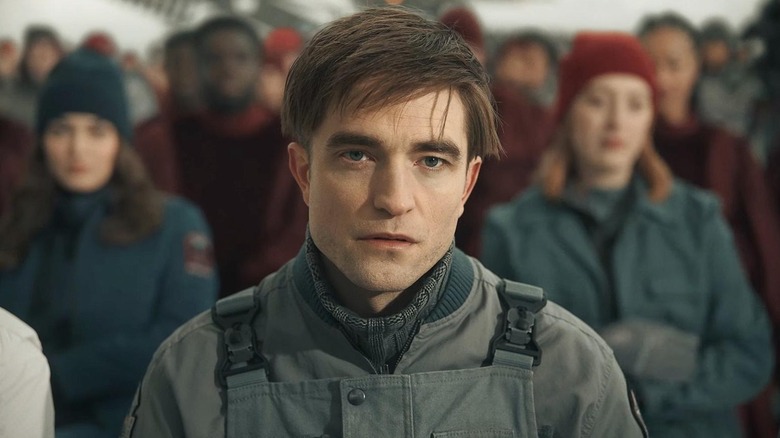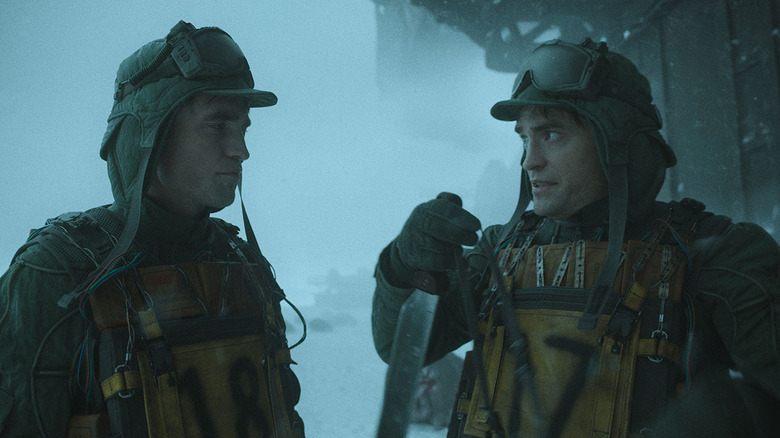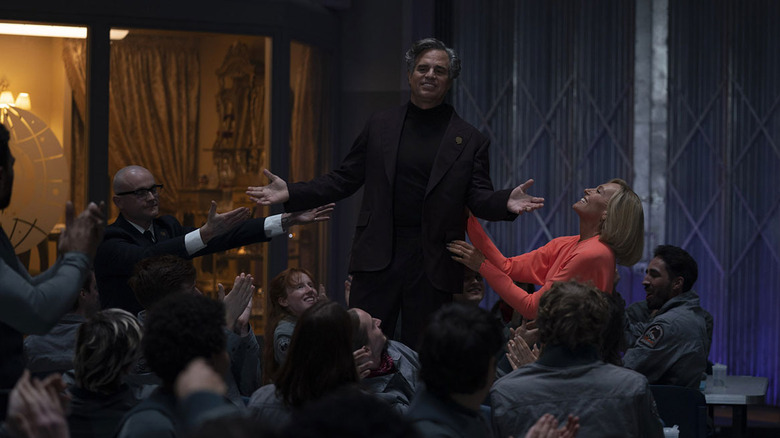Mickey 17 Review: Robert Pattinson's Space Satire Plays It Too Safe
- Fun performances from the entire ensemble, especially Robert Pattinson’s dual leads
- Feels like an expansion of the themes Bong Joon Ho explored in Okja
- The satire is too on-the-nose, breaking the “show don’t tell” rule of comedy
- It becomes a disappointingly straightforward sci-fi blockbuster by the third act
If you felt that "Starship Troopers" played it too straight as a satire and needed more characters directly explaining to the audience that they were parodying fascism, then "Mickey 17" is for you. Bong Joon Ho's films have never been particularly subtle in their social critique, but after the deservedly acclaimed upper-class skewering of "Parasite," it has been forgotten that the Korean director's screenplays more commonly tend to be on the heavy-handed side.
Nobody in the audience could possibly miss that Bong's tale of space colonization is about the revival of fascism in the current moment, especially when there's an antagonist (Mark Ruffalo) who speaks with a Trump-like cadence and dreams of leading a "human race as pure as white snow" on the planet of Niflheim. What is being satirized needs no further explanation, but the film needs to have characters frequently underline these broad strokes wherever possible, in case any viewer gets lost without exposition.
It's a shame to have to lead with the disappointing aftertaste of "Mickey 17" when so much of the film is delightfully idiosyncratic next to countless dystopian blockbusters. In fact, the movie it resembles most is Bong's previous English-language feature, "Okja," to the point it could be considered an intergalactic companion piece.
Not the sum of its parts
Bong Joon Ho's previous exploration of how late capitalism breeds anti-climate authoritarianism has been transplanted to outer space, where failed Senator Kenneth Marshall (Mark Ruffalo) leads a four-year expedition to transplant mankind to the distant planet of Niflheim, hoping to kill off the cute race of alien critters — inaccurately described by Marshall's wife (Toni Collette) as appearing like "croissants dipped in s**t" — for whom this is their natural habitat. Much more ambitious than "Okja," however, are Bong's attempts to make the inhabitants of the spacecraft resemble Trump-era American society as a whole, offering food for thought while simultaneously feeling like certain plot strands on the peripheries — such as hints of a widespread drug addiction problem — were hacked to pieces in the cutting room.
At the center of this is Mickey Barnes (Robert Pattinson), who alongside best friend Timo (Steven Yeun) aim to escape debt collectors by taking jobs on board the ship. With few qualifications to his name, Mickey applies to be an "expendable," having his DNA stored so he can be sent on deadly research missions and resurrected from the dead, all in the name of creating vaccines so that humanity can safely move onto this distant planet. With a cartoonish accent and bewildered, gormless expression permanently etched onto his face, Pattinson is as well-suited to Bong's live-action cartoon environment as you'd expect; if anything, the surprise is just how much an actor increasingly known for his wild vocal swings and unhinged physical comedy plays down those impulses where possible. By the midway point, he begins to feel like the rare everyman figure in Pattinson's filmography, whose woes are all down to the relatable human flaw of not reading the small print before signing a contract; the arrival of a more psychopathic "multiple," eager for revenge on his superiors the way Mickey refrains from being, only underlines him as an unconventional audience surrogate even more.
The first two acts do a stellar job at fleshing out the ecosystem of the ship, where scientists, workers, and despotic rulers all try to be the main group steering toward humanity's future. It's also here where Bong's screenplay tries its best to reflect Edward Ashton's more thoughtful source novel, which aimed to grapple with the morality behind its scientific conceits and weigh up the ethics of a program designed to dehumanize workers — perhaps the only subtlety in the script is the space it affords viewers to read parallels between this and the rise of automation in the workplace. Thanks to the director's sense of humor, it never gets too weighed down with its heady conceits, even if there are moments where it distractingly pulls some punches; a much-anticipated sequence teased in the trailer, where two iterations of Mickey join girlfriend Nasha (Naomi Ackie) in a threesome, is interrupted before any freaky stuff happens. In the rare $150 million blockbuster that doesn't feel like it was at the behest of endless studio interference, this is one of the few moments that feels like it was changed due to a panicked studio note.
More conventional than expected
The heavy-handedness of Bong Joon Ho's writing in previous films — as much as I'm a big fan of several — is why I can't similarly attribute the disappointingly straightforward final act as a result of studio executive meddling. Mark Ruffalo's delightful pantomime villain performance is undercut by heroic characters explaining his many obvious flaws they assume we won't have picked up on, and the relationship between mankind and nature is revealed to be the driving force in the way it was with "Okja."
Even the big action sequence it builds toward is something of an anti-climax, feeling little different to any post-"Star Wars" space opera as the characters descend into an Arctic Tundra to fight for the destiny of the alien critters. For a film as elegantly directed as "Mickey 17" is, there's little distinction in this closing stretch; all the ideas and offbeat conceits that have been percolating throughout wind up amounting to little more than an Arctic chase. After leaving the screening, I clung onto the first two-thirds of the movie as proof I was only slightly underwhelmed. The further I've gotten from it, the more I've found myself disappointed at how, well, ordinary it is — a well-made, enjoyable blockbuster, but where none of the quirks or social satire add up to an entirely satisfying whole.
With "Snowpiercer," Bong's far superior English-language dystopian tale, the director famously fought Harvey Weinstein to retain final cut in the American market; the demonic producer infamously thought the film's class struggle critique wouldn't translate to audiences in the "flyover states." The most damning thing about "Mickey 17" might be that it approaches its subject matter with this criticism seemingly in mind, bending over backwards so no conceit could possibly get lost in translation to any audience member.
Additionally, it feels like a far more expansive tale was lost in the editing suite — Steven Yeun's character, in particular, feels like his screen time was drastically reduced in post-production, his arc designed to mirror Mickey's (with whom he has the most intriguingly complicated relationship), yet is relegated to being a background character despite his third-billing, even as his journey is established adjacent to the protagonist's. Bong is a successful populist storyteller, but by the end, I feel like he became less confident in sticking to his instincts due to the scale of the project. It's the weakest of his three English language efforts due to it feeling like he's watering down his satirical approach, spoon-feeding exposition to his audience alongside each joke under the worry that the parody might go over their heads.
"Mickey 17" is released in U.S. theaters on March 7.


